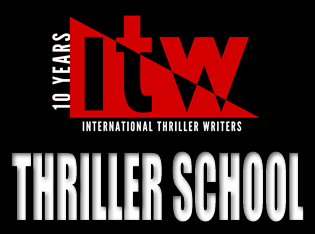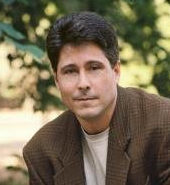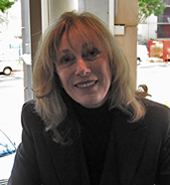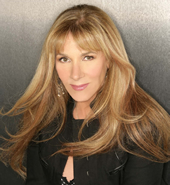Special to the Big Thrill: ITW’s Online ThrillerSchool
 THRILLER SCHOOL: ITW’s New On-Line Craft School
THRILLER SCHOOL: ITW’s New On-Line Craft School
Want to write a better thriller? Want to crack into publishing? Or maybe the bestseller list? Here’s your chance.
Thriller School begins April 7.
Fiction writing isn’t easy. Not for anyone. Whether you’re writing your first manuscript or your fiftieth, it’s difficult and time-consuming work. And a life-long pursuit. Professional writers never cease improving their craft. I think every writer understands this simple truth.
Virtually any writer will tell you that regardless of how many times you’ve done it or how far up the bestseller list you’ve climbed, that first blank page is a scary proposition. Fears and self-doubts always rise up.
But experienced writers will quickly add that the more you know, the more you write, and the more tools you have at hand, the less intimidating the process.
This is where Thriller School comes in.
For years ITW has presented CraftFest at ThrillerFest each July in New York. The success of CraftFest is primarily due to the outstanding cadre of teachers, many of whom are New York Times bestselling and award-winning authors, that come each year and share their knowledge and experience with both aspiring and published writers.
Now ITW has developed a new program to help writers continue their growth: Thriller School. In this seven-week program, the craft of thriller writing will be front and center. Each instructor will teach an aspect of craft through a podcast, written materials that include further reading and study suggestions, and an entire week of on-line Q&A with registered students. The goal is simple: to make each student a better writer.
We are very excited about this new endeavor. I think you will be also. Here is the schedule for the inaugural program along with a few words from our instructors:
Storytelling: What Makes A Good Story?—Steven James
From Steven James:
 I became a novelist because I read a novel that sucked.
I became a novelist because I read a novel that sucked.
Years ago when I was toying with some ideas for my first novel, I read a thriller that everyone was talking about. Well, the further I got into the book, the more problems I found. Honestly, I was astonished how bad the story was, and I remember actually pelting the book against the wall when I reached the end—I was so angry at having wasted my time on it. I thought, “If that’s the best that’s out there, I know I can write a better one.” So, I set out to do just that.
As it turned out, reading that novel was the best thing that ever happened to my writing career because it motivated me to write and taught me several lessons about what makes a story work.
For example: How do you keep a story escalating and believable while also providing twists and surprises that delight and satisfy readers? How do you shape a scene so that everything follows logically from the things that preceded it? These questions are vital to the storytelling process.
Back in the 1990s when I was studying for my master’s degree in storytelling, I learned principles that helped lay the foundation for my life as a novelist. The keys to great storytelling aren’t complex. Once you know what you’re looking for you’ll be able to improve the stories that you write by providing a stronger orientation to the world of the story, a more impactful crisis or calling event, and a better, more believable escalation that leads to a transformative moment at the story’s climax.
Taking the principles that I learned in an academic setting and have fleshed out and applied over the last ten novels, I’ve sought to share these storytelling tips that will help all novelists—both those who are accomplished and those who are aspiring—to become more successful.
So, get angry at mediocrity, get informed on how to write well, and then get busy producing stories that will impact and change the world.
This course will show you how.
Voice: Who’s Telling the Tale?—D. P. Lyle
From D. P. Lyle:
 What is voice? Where does it come from? Why is it important?
What is voice? Where does it come from? Why is it important?
Voice is your distinctive writing style. Your way to tell the tale. It’s phrasing and word choice. It’s sentence and paragraph structure. It’s the single thing that is distinctly you. It’s the sound and feel and emotion of your writing. It’s what you “hear” in your head when you read a story. The thing that identifies the writer.
Think about your favorite writers. If you opened a coverless book to any page, could you identify the author from the words on the page? With many authors that’s exactly the case. James Lee Burke, Elmore Leonard, Hemingway, each had such distinctive voices that their heart and soul is there on each page.
Make no mistake, voice is not easy to come by. It takes time. It requires reading widely, writing extensively, and the confidence that comes from these two activities that you can tell your story your way.
And it is critically important. Ask any agent or editor what they’re looking for and they will say things like:
I want something fresh.
I want something that speaks to me.
I want something that stirs my emotions.
I want something personal and unique.
What they mean is that they are searching for the next great voice.
In this class we will look at voice. What it is and what it isn’t as well as some practical tips that will help you find your own unique voice. Examples will be provided in both the lecture and the handout, and the further-study assignments will lead you down the path to discovering your own special way of “spinning your yarn.”
Character: Who Are These People and Where Did They Come From?—Bob Dugoni
From Robert Dugoni:
 What is it about certain books that when we finish the final page the memory of the characters stays with us for days? We wonder what will happen to them next and will their lives turn out well? What is it about those characters that has made them so memorable? Why do characters in a novel need to evolve and how do authors show those characters developing along with the plot? How can we create characters that are real, yet larger than life, show our characters strengths and limitations, and get the reader not just thinking about, but caring about what is about to happen next? Using examples from his own work, as well as other well-known novels and movies, in Thriller School I will teach time-tested techniques to help writers make their characters well-rounded heroes and villains readers will root for and against and, most importantly, stay up long after bedtime to finish the adventure.
What is it about certain books that when we finish the final page the memory of the characters stays with us for days? We wonder what will happen to them next and will their lives turn out well? What is it about those characters that has made them so memorable? Why do characters in a novel need to evolve and how do authors show those characters developing along with the plot? How can we create characters that are real, yet larger than life, show our characters strengths and limitations, and get the reader not just thinking about, but caring about what is about to happen next? Using examples from his own work, as well as other well-known novels and movies, in Thriller School I will teach time-tested techniques to help writers make their characters well-rounded heroes and villains readers will root for and against and, most importantly, stay up long after bedtime to finish the adventure.
Plot: Not Just One Damn Thing After Another—Gayle Lynds
From Gayle Lynds:
 For me, plotting is the most difficult part of writing. It’s like banging my head against a concrete wall. It’s like having to take a dose of castor oil. Worse, it’s like being stuck in a traffic jam on the George Washington Bridge trying to get into Ft. Lee, New Jersey. We know how well that worked.
For me, plotting is the most difficult part of writing. It’s like banging my head against a concrete wall. It’s like having to take a dose of castor oil. Worse, it’s like being stuck in a traffic jam on the George Washington Bridge trying to get into Ft. Lee, New Jersey. We know how well that worked.
Still, I had to learn to plot so I could create the kinds of books I loved to read.
So my class is full of information, anecdotes, and examples of what I wish someone had told me back in the Dark Ages when I began writing. First up, fyi, “plot” is not a dirty four-letter word. It’s a beautiful word because it describes the muscle of storytelling. Ever since cave folks sat around fires chewing leather and telling stories, plot has been critical. Beowulf, one of the Western world’s earliest thrillers, is a fine example. Without plot, we’d know only that Beowulf killed a monster called Grendel. But with plot, we get to see the whole exciting drama.
Unfortunately, plot has a bad rap these days. Some people believe being able to plot well means you’re a hack, that you’re a commercial writer who writes only for money, and/or (take your pick) you don’t have the talent to do any better.
With those prejudices in the literary air, it’s no wonder many authors want to be known as character-driven writers. That’s nonsense for a lot of different reasons, primarily that without plot your story would be dead on the page. At the same time, of course, one doesn’t want the plot to be the only dominant force.
The truth is, great plots illuminate stories and give characters the opportunity to reveal themselves not only to the reader but to themselves. In fact, the best plots are invisible. That’s how good they can be. In other words, when characters and story are so interwoven that one can’t imagine the events with any other characters … the writer has succeeded. The plot is so very good no one’s paying attention to it.
You, the writer, may not get any credit for it, but your story will soar, and the irony of it is, you’ll be known as a character-driven writer.
There’s an old saying in writing—no one can be taught to write, but you can learn to write. In the same vein, you really can learn to plot.
Point Of View: Who’s Driving The Scene?—Andrew Gross
From Andrew Gross:
 Discussing Point of View may be as dry as a subject can be… Especially when we’re talking about Thrillers. Yet we’ve all faced it at some point: Whose perspective to set it in. Which works best? A limited, but familiar voice or more of a universal, all-seeing narrator? Do I bring the lens close-in, so you’re right inside the hero’s mind, or go for a more distant, more authorial viewpoint? Each comes with both advantages and costs. And it’s important you know them. I can’t tell you how many times in the Q and A after some talk I’ve done, people have come up to me with that befuddled look in their eyes and the question has something to do with point of view.
Discussing Point of View may be as dry as a subject can be… Especially when we’re talking about Thrillers. Yet we’ve all faced it at some point: Whose perspective to set it in. Which works best? A limited, but familiar voice or more of a universal, all-seeing narrator? Do I bring the lens close-in, so you’re right inside the hero’s mind, or go for a more distant, more authorial viewpoint? Each comes with both advantages and costs. And it’s important you know them. I can’t tell you how many times in the Q and A after some talk I’ve done, people have come up to me with that befuddled look in their eyes and the question has something to do with point of view.
So I’ll do my best to show you why, in my view, there are no unbreakable rules—only how deftly and artfully you carry it off. And I’ll give you some specific take-home value to determine what’s best for you. I’ll show you how a scene changes, grows, simply by shifting point of view. And, how changing it can also ramp up the pace. So despite its inherent dryness, point of view may be the most important stylistic decision you’ll make, because its handprint is on every page. You want to make the right call, and I’m pretty sure this little talk will help you.
Dialog: What Are Your Characters Really Saying?—Linwood Barclay
I love dialogue. I like writing it more than any other part of a novel, aside from the last line. I’d rather write ten pages of dialogue than a single page of description.
Why do I love writing dialogue so much? Let me count the ways:
1. A line of dialogue can tell us more about a character than a page of description.
2. Dialogue can move the plot elements forward.
3. Dialogue is as much fun to read as it is to write. It makes the story move more swiftly.
4. You can break all the rules in dialogue. When someone says “who” when they should have said “whom” and a know-it-all reader sends an email to tell you about this, you can say it wasn’t your fault, the character just didn’t know any better.
5. Ditto for swearing.
Long passages of description certainly have their place in a novel, but I kind of come down with Elmore Leonard on this one when he said that these are the parts people skip over.
I believe a reader’s eye often jumps to the passages of dialogue because that’s where they get the real information. People are saying what they’ve done, and what they’re going to do.
In my Thriller School class, I’ll get into why dialogue works for me, and offer some suggestions on how to make what the characters say in your own thriller more believable, more entertaining, and more productive.
Setting, Mood, Atmosphere: What’s the “Feel” of Your Story?—Heather Graham
I remember reading from the time I was a child—and how time and place and atmosphere became such characters within themselves that I couldn’t wait to see, feel, and experience different places and environments.
Naturally, children and young adults pick up the reading material in their houses. My dad had been a U.S. Navy man in World War II and through some of his books, I could feel the swampy heat of certain Pacific islands, I could hear the sirens that warned of bombs and imagine the natural beauty of a pristine beach—before the guns and the bombs destroyed them. A Scotsman brought to the new world, he came with tales of Wallace long before Mel Gibson wore a kilt—and I couldn’t wait to go home to Stirling with him, see the rise of great castles and feel the dampness of the moors.
My mom was born in Dublin. This created a bit of controversy in the family—understandable only if you come from such a background where history—more than the reality of people—created bloodshed throughout the centuries that, to an American-born child, made no sense. So I read books on “the Troubles” and Bloody Sunday and how the first president of the Republic of Ireland had been born an American—and had only lived to serve in such a capacity because he had been American. I wanted to see Dublin and Temple Bar and relive the Viking founding and . . . .
Well, a good book does that to you.
At the same time, my parents were both Poe fanatics and I would read tales in which the atmosphere was so intense, I actually felt as if my blood was running cold. All this with words.
One of the first books my father ever gave me was a Reader’s Digest Treasury for Young People. From its pages I learned about Pompeii and the incredible power of a volcano. I leaned about the Titanic, and while I didn’t learn everything, I could imagine the horror and had to learn more. As a child growing up in Florida, I didn’t understand at first why the people didn’t just swim. And so my next book explained to me the absolutely frigid temperatures that could exist and how one didn’t have much time before dying of hypothermia.
Perhaps it’s not really so important that every reader want to go to a place. I mean, let’s face it—there is no way any of us can really go back to the Civil War or the Revolution or other great and momentous era in history. But our history shapes us—and remnants stay with us.
Perhaps we don’t need to go back in history. But, take New Orleans. (Please do; if you haven’t been come down and visit—it’s an extraordinary city.) The decaying elegance of above ground cemeteries, the balconies, the heat, the French and Spanish architecture . . . all this forged through time, and yet, we now have a city where mystery and mystique are in the air. In the best books, you’ll see and feel it; you’ll want to walk the grounds and breathe in the air (even when it’s a little rank on Bourbon Street before the street cleaners sweep through!).
I love time and place. And I love the concept of making someone long to gallop across the moors, touch the grave of Marie Laveau, or tread the streets where Wall Street meant a wall and where financial deals still govern the fate of nation. See it, feel it . . . know it. Think about it—your favorite books put you there, right in with the action, and right in with the people experiencing it all.
*****
 Please join us and let us help you take your writing and storytelling to the next level.
Please join us and let us help you take your writing and storytelling to the next level.
More Information and registration can be found on the Thriller School website.
D. P. Lyle
ITW VP for Education & Members Services
CraftFest Director
- THE GOD IN THE SEA with Paul Kemprecos - April 4, 2024
- FOR WORSE with L. K. Bowen - April 4, 2024
- HIT AND RUN with Vincent Zandri - April 4, 2024


